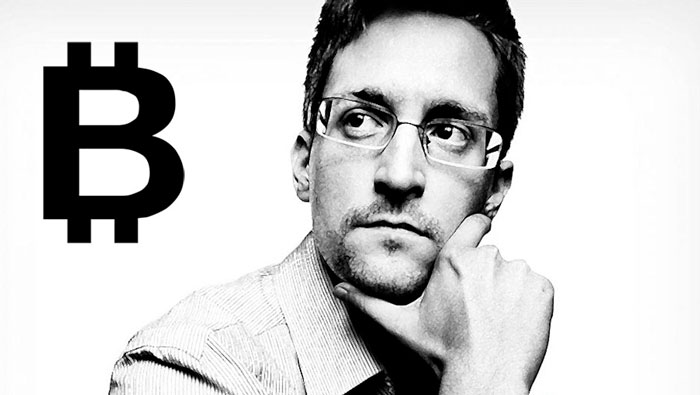
Former US National Security Agency (NSA) consultant Edward Snowden wrote a caustic tweet thatCentral Bank digital currencies (CBDCs) can "inadvertently [destroy] the savings of all employees" of a country.
Snowden criticized the idea of CBDC, digital currenciesbacked by central bank money, commenting on an article by New York Times guest columnist Eswar Prasad, professor of trade policy at Cornell University.
Dr. Prasad emphasized the accelerating movement towardscashless economy, as evidenced by research and testing of CBDC in countries such as China, Sweden, Japan, UK. He also recalled the European Central Bank, which this summer warned the governments of the countries that the technology sector will soon overtake them if they do not start creating their own digital currencies.
Snowden highlighted part of Dr. Prasad's article wherethe scientist put forward the theory that since the American economy is in a difficult situation, and the Federal Reserve System has already lowered the interest rate under its control to zero.
"The Fed can set a negative interest rate by gradually reducing the balances of digital money in the accounts of every citizen."
It should be noted that if inflation is too lownegative interest rates can stimulate borrowing and spending, which in turn drives interest rates back to normal levels. Since storing cash is expensive in itself and requires a safe place to store it, a bank is more likely to either lend money to other banks or pay a negative interest rate.
Despite the fact that for commercial banks it iscould be useful, Snowden believes that Prasad's theory is not good for ordinary depositors under the new CBDC regime. He argues that currencies will be "a useful political tool for inadvertently destroying the savings of all employees in the country, if they do not have time to spend them quickly enough."
What is a Central Bank Digital Currency, you ask?Oh, you know: just a «useful policy tool» for casually annihilating the savings of every wage-worker in the country if they don’t spend them fast enough. https://t.co/TAKQCEDcOX
- Edward Snowden (@Snowden) October 9, 2021
Snowden then went on to blog about the concerns surrounding CBDC. There he named CBDC:
"Perversion ... of the fundamental principles andcryptocurrency protocols, a crypto-fascist currency, an evil double entered into electronic registries in order to deprive users of the right to own their money and establish the state as the main intermediary of every transaction. "
Snowden began with a brief history of money - from theirof modest origin in the form of rare pieces of precious metal mined from the bowels of the earth, before their current incarnation, often in the form of numbers in a banking application.
Then he explained the essence of decentralizedcryptocurrencies such as Bitcoin and Ethereum, which offer a method of storing and free trading money without intermediaries in the form of banks and financial firms. At the same time, he suggested that CBDCs threaten the principles of cryptocurrency by radically "re-centralizing" the monetary system and returning every digital penny to the control of the central bank.
Some algorithmic stablecoins doexactly what Snowden fears, namely, removing money from people's wallets in order to change their total quantity and value. The difference is that these mechanisms, known as rebases, happen autonomously according to parameters set by the community, not central banks, which Snowden does not trust.
Snowden is not alone in his skepticismrelation to CBDC. A survey of 2,500 British adults conducted by Redfield & Wilton Strategies, on behalf of the US company POLITICO, in August, showed that only 24% of respondents believe that CBDCs will be beneficial to society; 30% believe they will do more harm than good. About three quarters of respondents were concerned about the possibility of cyber attacks on the CBDC issued by the Bank of England.
The hype around CBDC continues unabated, but people are clearlyworried that their money could be attacked by cybercriminals or, in the case of Edward Snowden and Dr. Prasad, the central bank of their own government.
Where is it more profitable to buy bitcoin? TOP-5 exchanges
For a safe and convenient purchase of cryptocurrencies with a minimum commission, we have prepared a rating of the most reliable and popular cryptocurrency exchanges that support deposits and withdrawals of funds inrubles, hryvnias, dollars and euros.
The reliability of the site is primarily determinedtrading volume and number of users. By all key metrics, the largest cryptocurrency exchange in the world is Binance. Binance is also the most popular crypto exchange in Russia and the CIS, since it has the largest cash turnover and supports transfers in rubles from bank cardsVisa / MasterCardand payment systemsQIWI, Advcash, Payeer.
Especially for beginners, we have prepared a detailed guide: How to buy bitcoin on a crypto exchange for rubles?
Rating of cryptocurrency exchanges:
| # | Exchange: | Website: | Rating: |
|---|---|---|---|
| 1 | Binance (Editor's Choice) | https://binance.com | 9.7 |
| 2 | Huobi | https://huobi.com | 7.4 |
| 3 | Exmo | https://exmo.me | 6.9 |
| 4 | OKEx | https://okex.com | 6.5 |
| 5 | Bybit | https://bybit.com | 6.3 |
The criteria by which the rating is set in our rating of crypto-exchanges:
- Work reliability— stability of access to all functions of the platform, including uninterrupted trading, deposits and withdrawals of funds, as well as the duration of the market and daily trading volume.
- Commissions– the amount of commission for trading operations within the platform and withdrawal of assets.
- Additional features and services— futures, options, staking, NFT marketplace.
- Feedback and support– we analyze user reviews and the quality of technical support.
- Convenience of the interface– we evaluate the functionality and intuitiveness of the interface, possible errors and failures when working with the exchange.
- final grade– the average number of points for all indicators determines the place in the ranking.

Rate this publication




